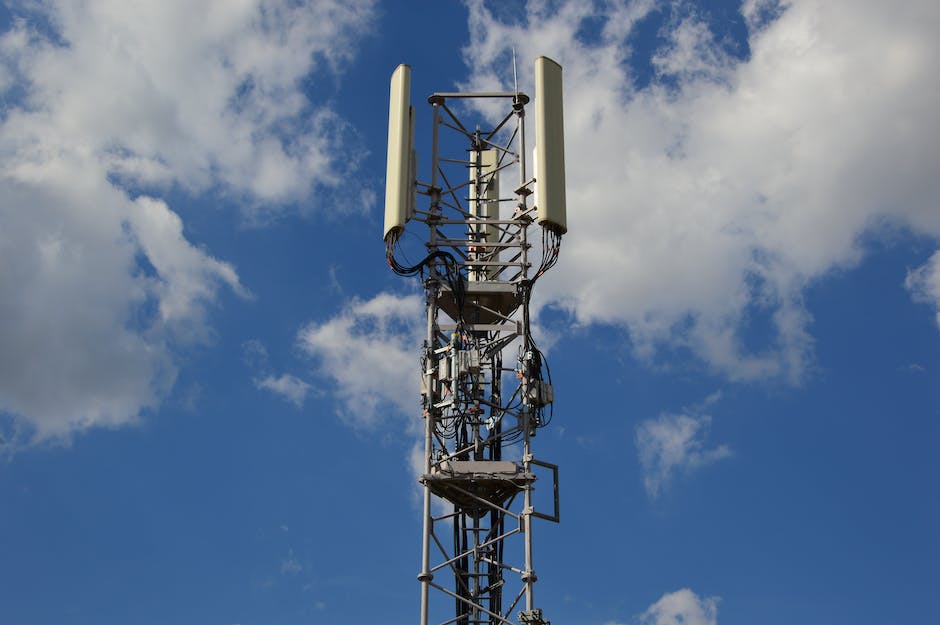Table of Contents
- Introduction
- Major Telecommunication Companies Driving 5G Adoption in Businesses
- Role of Tech Giants in Shaping 5G Adoption in Business Environments
- Small and Medium-Sized Enterprises Embracing 5G Technology for Competitive Advantage
- Government Initiatives and Policies Promoting 5G Adoption in Business Sectors
- Q&A
- Conclusion
Industry Titans Paving the Way for 5G Revolution in Businesses
Introduction
The adoption of 5G technology in businesses is being led by a variety of players across different industries.
Major Telecommunication Companies Driving 5G Adoption in Businesses

The adoption of 5G technology is rapidly gaining momentum across various industries, and businesses are at the forefront of this revolution. As companies strive to stay ahead of the competition and meet the growing demands of their customers, they are turning to major telecommunication companies to provide them with the necessary infrastructure and services to implement 5G technology.
One of the leading players in driving 5G adoption in businesses is Verizon. With its extensive network coverage and commitment to innovation, Verizon has been actively working towards the deployment of 5G technology. The company has already launched 5G in select cities and plans to expand its coverage nationwide in the coming years. Verizon’s focus on providing businesses with high-speed, low-latency connectivity has made it an attractive choice for companies looking to leverage the benefits of 5G technology.
AT&T is another major telecommunication company that is leading the way in 5G adoption. With its vast network infrastructure and investments in research and development, AT&T has been at the forefront of developing and deploying 5G technology. The company has already launched 5G in several cities and has plans to expand its coverage further. AT&T’s commitment to providing businesses with reliable and secure connectivity has made it a preferred choice for many organizations.
T-Mobile is also making significant strides in driving 5G adoption in businesses. The company’s merger with Sprint has given it access to a broader spectrum and enhanced its capabilities to deliver 5G services. T-Mobile has already launched its nationwide 5G network and is actively working towards expanding its coverage. With its focus on providing businesses with affordable and scalable solutions, T-Mobile is attracting a growing number of companies looking to embrace 5G technology.
In addition to these major telecommunication companies, there are also other players in the market that are driving 5G adoption in businesses. For example, Nokia and Ericsson, two leading providers of telecommunications equipment, are working closely with businesses to help them implement 5G technology. These companies offer a range of solutions, including network infrastructure, software, and services, to enable businesses to leverage the full potential of 5G.
The benefits of 5G technology for businesses are vast. With its ultra-fast speeds and low latency, 5G enables businesses to enhance their operations and deliver new and innovative services to their customers. Industries such as healthcare, manufacturing, transportation, and entertainment can greatly benefit from the increased connectivity and improved performance that 5G offers.
As businesses continue to embrace 5G technology, major telecommunication companies are playing a crucial role in driving its adoption. With their extensive network coverage, commitment to innovation, and focus on providing businesses with reliable and scalable solutions, these companies are enabling organizations to unlock the full potential of 5G. As the demand for 5G technology continues to grow, it is expected that more businesses will turn to these major telecommunication companies to help them navigate the complexities of implementing and leveraging 5G technology.
Role of Tech Giants in Shaping 5G Adoption in Business Environments
The adoption of 5G technology in businesses is a topic of great interest and importance in today’s digital age. As this revolutionary technology promises faster speeds, lower latency, and increased connectivity, businesses across various industries are eager to embrace it. However, the question arises: who is leading the adoption of 5G technology in businesses? In this section, we will explore the role of tech giants in shaping the adoption of 5G in business environments.
Tech giants such as Apple, Google, and Microsoft have always been at the forefront of technological advancements. Their influence and resources make them key players in driving the adoption of 5G technology in businesses. These companies have been investing heavily in research and development to ensure that their products and services are compatible with the new technology.
Apple, for instance, has been actively working on integrating 5G capabilities into its devices. The company’s latest iPhone models are equipped with 5G technology, allowing users to experience faster download and upload speeds. By doing so, Apple is not only catering to the demands of its customers but also encouraging businesses to adopt 5G technology to enhance their operations.
Similarly, Google has been actively involved in the development of 5G technology. The company has been working on Project Loon, which aims to provide internet access to remote areas using high-altitude balloons. By leveraging 5G technology, Google can expand the reach of its project and enable businesses in these areas to access high-speed internet, thereby fostering economic growth and development.
Microsoft, on the other hand, has been focusing on the integration of 5G technology into its cloud computing services. The company’s Azure platform offers businesses the ability to leverage the power of 5G networks to enhance their operations. With the increased speed and connectivity offered by 5G, businesses can access and process data more efficiently, leading to improved productivity and innovation.
In addition to these tech giants, telecommunications companies such as Verizon, AT&T, and T-Mobile are also playing a crucial role in driving the adoption of 5G technology in businesses. These companies are investing heavily in building and expanding their 5G networks, ensuring that businesses have access to reliable and high-speed connectivity.
Furthermore, these telecommunications companies are partnering with businesses to develop industry-specific use cases for 5G technology. For example, Verizon has collaborated with healthcare providers to explore how 5G can revolutionize telemedicine and remote patient monitoring. By working closely with businesses, these companies are not only driving the adoption of 5G but also shaping its implementation in various industries.
In conclusion, tech giants and telecommunications companies are leading the adoption of 5G technology in businesses. Through their investments in research and development, integration of 5G capabilities into their products and services, and partnerships with businesses, these companies are driving the adoption of 5G technology and shaping its implementation in business environments. As businesses continue to recognize the potential of 5G in enhancing their operations, it is crucial for them to collaborate with these tech giants and telecommunications companies to fully leverage the benefits of this revolutionary technology.
Small and Medium-Sized Enterprises Embracing 5G Technology for Competitive Advantage
Small and Medium-Sized Enterprises Embracing 5G Technology for Competitive Advantage
In today’s fast-paced and highly competitive business landscape, staying ahead of the curve is crucial for small and medium-sized enterprises (SMEs) to thrive. One technology that has been making waves and capturing the attention of businesses across various industries is 5G. With its promise of ultra-fast speeds, low latency, and massive connectivity, 5G is set to revolutionize the way businesses operate. But who is leading the adoption of this groundbreaking technology among SMEs?
Research indicates that SMEs are increasingly recognizing the potential of 5G and are actively embracing it to gain a competitive advantage. While larger corporations may have the resources to invest in cutting-edge technologies, SMEs are proving to be nimble and quick to adapt to change. They understand that being early adopters of 5G can give them a significant edge over their competitors.
One of the key reasons why SMEs are embracing 5G is its potential to enhance productivity and efficiency. With faster download and upload speeds, businesses can transfer large files, access cloud-based applications, and collaborate in real-time without any lag. This means that SMEs can streamline their operations, improve communication, and deliver products and services more efficiently, ultimately leading to increased customer satisfaction.
Moreover, 5G’s low latency enables SMEs to leverage emerging technologies such as the Internet of Things (IoT) and artificial intelligence (AI). By connecting a multitude of devices and sensors, businesses can gather real-time data and gain valuable insights into their operations. This data-driven approach allows SMEs to make informed decisions, optimize processes, and identify new revenue streams. For instance, a manufacturing company can use IoT-enabled sensors to monitor equipment performance, detect anomalies, and proactively schedule maintenance, reducing downtime and costs.
Another factor driving the adoption of 5G among SMEs is its potential to enable innovative business models. With its high-speed and reliable connectivity, 5G opens up new possibilities for remote work, virtual reality, and augmented reality applications. SMEs can leverage these technologies to offer immersive experiences, virtual showrooms, and remote collaboration, expanding their reach and attracting a global customer base. This level of connectivity also enables SMEs to tap into emerging markets and explore new business opportunities that were previously inaccessible.
Furthermore, SMEs are recognizing the importance of 5G in future-proofing their businesses. As technology continues to evolve at a rapid pace, it is crucial for SMEs to stay ahead of the curve. By adopting 5G early on, businesses can ensure that they are well-positioned to leverage future advancements and remain competitive in the long run. This forward-thinking approach allows SMEs to adapt to changing customer demands, industry trends, and technological innovations, ensuring their sustainability and growth.
In conclusion, small and medium-sized enterprises are leading the adoption of 5G technology for competitive advantage. Recognizing its potential to enhance productivity, enable innovative business models, and future-proof their operations, SMEs are embracing 5G to stay ahead of the curve. By leveraging the speed, low latency, and massive connectivity of 5G, SMEs can streamline their operations, make data-driven decisions, and tap into new markets. As the business landscape continues to evolve, it is clear that SMEs are at the forefront of embracing this groundbreaking technology.
Government Initiatives and Policies Promoting 5G Adoption in Business Sectors
Government Initiatives and Policies Promoting 5G Adoption in Business Sectors
The adoption of 5G technology in businesses is gaining momentum worldwide, with governments playing a crucial role in promoting its implementation. As the benefits of 5G become increasingly apparent, governments are taking proactive measures to ensure that their countries remain at the forefront of this technological revolution. In this article, we will explore some of the government initiatives and policies that are driving the adoption of 5G technology in business sectors.
One of the key ways in which governments are promoting 5G adoption is through the allocation of spectrum. Spectrum refers to the radio frequencies that enable wireless communication, and it is a limited resource. Governments are responsible for managing and allocating spectrum to different industries, including telecommunications. In order to facilitate the deployment of 5G networks, governments are making additional spectrum available specifically for 5G use. This ensures that businesses have access to the necessary resources to implement 5G technology and take advantage of its capabilities.
In addition to spectrum allocation, governments are also investing in the development of 5G infrastructure. Building a robust and reliable 5G network requires significant investment in infrastructure, such as the installation of new base stations and the upgrading of existing ones. Governments are providing financial support and incentives to telecommunication companies to encourage them to invest in 5G infrastructure. This not only benefits businesses by providing them with the necessary infrastructure but also helps to create jobs and stimulate economic growth.
Furthermore, governments are implementing policies and regulations that support the deployment of 5G technology. These policies aim to streamline the process of obtaining permits and licenses for the installation of 5G infrastructure. By reducing bureaucratic hurdles, governments are enabling businesses to quickly and efficiently implement 5G technology. Additionally, governments are working to harmonize regulations across different regions and countries to facilitate international cooperation and interoperability of 5G networks. This is particularly important for businesses that operate globally and rely on seamless connectivity.
Another important aspect of government initiatives is the promotion of research and development in 5G technology. Governments are investing in research programs and providing grants to universities and research institutions to encourage the development of innovative 5G solutions. By fostering a culture of innovation, governments are ensuring that businesses have access to cutting-edge technologies and solutions that can drive their growth and competitiveness.
Moreover, governments are actively collaborating with industry stakeholders to develop standards and best practices for 5G technology. Standardization is crucial for the widespread adoption of any technology, as it ensures compatibility and interoperability. Governments are working closely with telecommunication companies, equipment manufacturers, and other stakeholders to establish common standards for 5G networks. This collaboration not only benefits businesses by providing them with a stable and reliable technology but also promotes healthy competition and innovation in the market.
In conclusion, government initiatives and policies are playing a pivotal role in driving the adoption of 5G technology in business sectors. Through spectrum allocation, infrastructure investment, policy implementation, research and development support, and collaboration with industry stakeholders, governments are creating an enabling environment for businesses to embrace 5G technology. As businesses recognize the immense potential of 5G, it is crucial for governments to continue their efforts in promoting its adoption and ensuring that their countries remain at the forefront of this technological revolution.
Q&A
1. Who is leading the adoption of 5G technology in businesses?
Telecommunications companies and technology giants are leading the adoption of 5G technology in businesses.
2. Are businesses in all industries adopting 5G technology?
Yes, businesses across various industries are adopting 5G technology.
3. What are the benefits of 5G technology for businesses?
Benefits of 5G technology for businesses include faster data transfer speeds, lower latency, increased capacity, improved connectivity, and support for emerging technologies like IoT and AI.
4. How is 5G technology expected to impact businesses in the future?
5G technology is expected to revolutionize industries by enabling advanced applications, enhancing productivity, enabling real-time data analysis, supporting autonomous vehicles, and transforming various sectors such as healthcare, manufacturing, and transportation.
Conclusion
In conclusion, various industries and businesses are actively adopting 5G technology. However, the telecommunications sector, followed by manufacturing, healthcare, and transportation, are leading the adoption of 5G technology in businesses.




